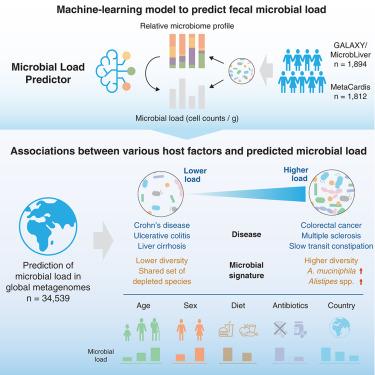Our official English website, www.x-mol.net, welcomes your
feedback! (Note: you will need to create a separate account there.)
Fecal microbial load is a major determinant of gut microbiome variation and a confounder for disease associations
Cell ( IF 45.5 ) Pub Date : 2024-11-13 , DOI: 10.1016/j.cell.2024.10.022 Suguru Nishijima, Evelina Stankevic, Oliver Aasmets, Thomas S.B. Schmidt, Naoyoshi Nagata, Marisa Isabell Keller, Pamela Ferretti, Helene Bæk Juel, Anthony Fullam, Shahriyar Mahdi Robbani, Christian Schudoma, Johanne Kragh Hansen, Louise Aas Holm, Mads Israelsen, Robert Schierwagen, Nikolaj Torp, Anja Telzerow, Rajna Hercog, Stefanie Kandels, Diënty H.M. Hazenbrink, Maja Thiele
Cell ( IF 45.5 ) Pub Date : 2024-11-13 , DOI: 10.1016/j.cell.2024.10.022 Suguru Nishijima, Evelina Stankevic, Oliver Aasmets, Thomas S.B. Schmidt, Naoyoshi Nagata, Marisa Isabell Keller, Pamela Ferretti, Helene Bæk Juel, Anthony Fullam, Shahriyar Mahdi Robbani, Christian Schudoma, Johanne Kragh Hansen, Louise Aas Holm, Mads Israelsen, Robert Schierwagen, Nikolaj Torp, Anja Telzerow, Rajna Hercog, Stefanie Kandels, Diënty H.M. Hazenbrink, Maja Thiele

|
The microbiota in individual habitats differ in both relative composition and absolute abundance. While sequencing approaches determine the relative abundances of taxa and genes, they do not provide information on their absolute abundances. Here, we developed a machine-learning approach to predict fecal microbial loads (microbial cells per gram) solely from relative abundance data. Applying our prediction model to a large-scale metagenomic dataset (n = 34,539), we demonstrated that microbial load is the major determinant of gut microbiome variation and is associated with numerous host factors, including age, diet, and medication. We further found that for several diseases, changes in microbial load, rather than the disease condition itself, more strongly explained alterations in patients’ gut microbiome. Adjusting for this effect substantially reduced the statistical significance of the majority of disease-associated species. Our analysis reveals that the fecal microbial load is a major confounder in microbiome studies, highlighting its importance for understanding microbiome variation in health and disease.
中文翻译:

粪便微生物载量是肠道微生物组变异的主要决定因素,也是疾病关联的混杂因素
各个栖息地的微生物群在相对组成和绝对丰度方面都有所不同。虽然测序方法确定了分类群和基因的相对丰度,但它们并不提供有关其绝对丰度的信息。在这里,我们开发了一种机器学习方法,仅根据相对丰度数据来预测粪便微生物载量(每克微生物细胞)。将我们的预测模型应用于大规模宏基因组数据集 (n = 34,539),我们证明微生物载量是肠道微生物组变异的主要决定因素,并且与许多宿主因素有关,包括年龄、饮食和药物。我们进一步发现,对于几种疾病,微生物载量的变化,而不是疾病状况本身,更有力地解释了患者肠道微生物组的变化。调整这种影响大大降低了大多数疾病相关物种的统计学意义。我们的分析表明,粪便微生物载量是微生物组研究中的主要混杂因素,突出了它对理解健康和疾病中微生物组变异的重要性。
更新日期:2024-11-13
中文翻译:

粪便微生物载量是肠道微生物组变异的主要决定因素,也是疾病关联的混杂因素
各个栖息地的微生物群在相对组成和绝对丰度方面都有所不同。虽然测序方法确定了分类群和基因的相对丰度,但它们并不提供有关其绝对丰度的信息。在这里,我们开发了一种机器学习方法,仅根据相对丰度数据来预测粪便微生物载量(每克微生物细胞)。将我们的预测模型应用于大规模宏基因组数据集 (n = 34,539),我们证明微生物载量是肠道微生物组变异的主要决定因素,并且与许多宿主因素有关,包括年龄、饮食和药物。我们进一步发现,对于几种疾病,微生物载量的变化,而不是疾病状况本身,更有力地解释了患者肠道微生物组的变化。调整这种影响大大降低了大多数疾病相关物种的统计学意义。我们的分析表明,粪便微生物载量是微生物组研究中的主要混杂因素,突出了它对理解健康和疾病中微生物组变异的重要性。






























 京公网安备 11010802027423号
京公网安备 11010802027423号